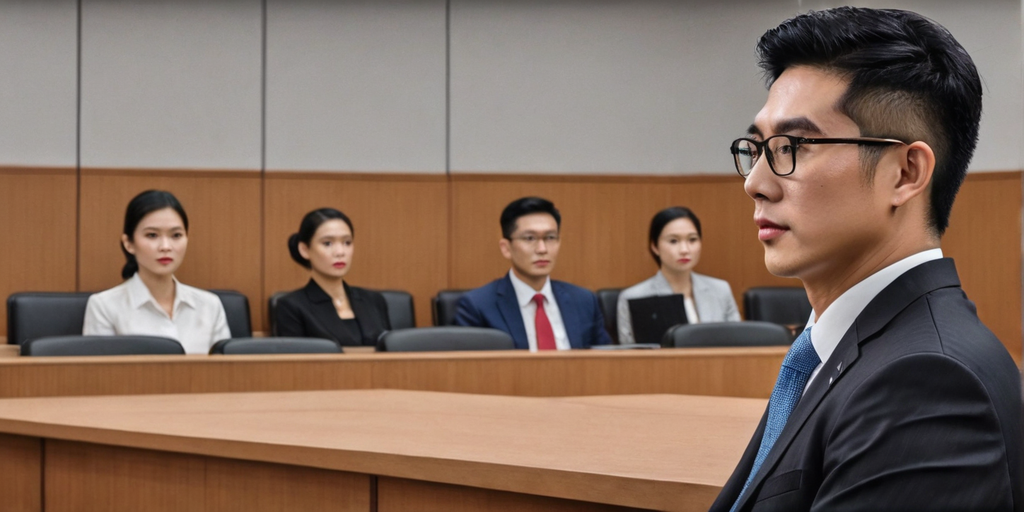Are you struggling with debt and considering bankruptcy in Singapore? While bankruptcy may seem like the only option, there are alternatives to bankruptcy in Singapore available that can help you avoid the long-term financial and legal consequences.
By exploring these alternatives, you may be able to manage your debt more effectively and get back on track financially.

Understanding Bankruptcy in Singapore is the first step in exploring your options. Bankruptcy is a legal process that involves handing over your assets to an Official Assignee who will then sell them to repay your creditors. While bankruptcy can provide a fresh start, it also has long-term consequences, including restrictions on travel, employment, and credit. Before considering bankruptcy, it’s important to understand the legal and financial implications of this process.
Exploring Bankruptcy Alternatives is the next step in managing your debt. Some alternatives to bankruptcy include Credit Counselling and Debt Management, Leveraging Assets and Income, and Long-Term Financial Planning. These options can help you manage your debt more effectively, negotiate with your creditors, and develop a long-term financial plan that will help you get back on track. By exploring these alternatives, you can avoid the long-term consequences of bankruptcy and take control of your financial future.
Key Takeaways
- Bankruptcy is not the only option for managing debt in Singapore
- Exploring alternatives to bankruptcy can help you avoid long-term financial and legal consequences
- Credit Counselling and Debt Management, Leveraging Assets and Income, and Long-Term Financial Planning are some alternatives to bankruptcy that you can consider.
Alternatives to Bankruptcy in Singapore: Understanding the Facts

If you find yourself in a situation where your debts have become unmanageable, it’s essential to understand the bankruptcy process in Singapore. This will help you make informed decisions about your financial situation and explore viable alternatives.
The Bankruptcy Process
In Singapore, bankruptcy proceedings are initiated when a debtor owes at least S$15,000 and is unable to repay the debt. The debtor, creditors, or the Official Assignee can file for bankruptcy. Once declared bankrupt, the Official Assignee takes charge of the debtor’s assets, and a debtor is subjected to various restrictions.
Consequences of Bankruptcy
Bankruptcy carries significant consequences, including restrictions on overseas travel, obtaining credit, managing a business, or acting as a company director. It also poses challenges in securing employment. Understanding these consequences is crucial as it enables you to evaluate the impact of bankruptcy on your financial and professional life.
By gaining a comprehensive understanding of the bankruptcy process and its implications, you can make informed decisions about managing your debts and explore viable alternatives to bankruptcy.
Alternatives to Bankruptcy in Singapore: Exploring Your Options

If you are facing financial difficulties, there are several alternatives to bankruptcy available in Singapore. These alternatives can help you manage your debts and avoid the negative consequences of bankruptcy. In this section, we will explore three common alternatives to bankruptcy: Debt Repayment Scheme, Voluntary Arrangements with Creditors, and Private Arrangements.
Debt Repayment Scheme
The Debt Repayment Scheme (DRS) is a debt management plan that allows you to repay your debts over a period of time through a court-approved repayment plan. This scheme is designed for individuals who have a regular income but are struggling to meet their debt obligations. To be eligible for the DRS, you must have a total debt of at least $15,000 and be able to make regular monthly payments towards your debts.
Under the DRS, your creditors will be required to freeze the interest and late payment fees on your debts. You will also be protected from legal action by your creditors as long as you make your payments on time. The repayment plan will be based on your income and expenses, and will be reviewed every six months to ensure that it is still affordable for you.
Voluntary Arrangements with Creditors
A Voluntary Arrangement with Creditors (VAC) is a formal agreement between you and your creditors to repay your debts over a period of time. This agreement is usually facilitated by a licensed insolvency practitioner who will negotiate with your creditors on your behalf. The VAC can be used to repay all of your debts or just a portion of them.
To be eligible for a VAC, you must have a regular income and be able to make regular payments towards your debts. You will also need to demonstrate that you have made efforts to repay your debts in the past. The insolvency practitioner will assess your financial situation and propose a repayment plan that is affordable for you.
Private Arrangements
A Private Arrangement is an informal agreement between you and your creditors to repay your debts over a period of time. This arrangement is not legally binding and does not involve a court or an insolvency practitioner. Instead, you will negotiate directly with your creditors to agree on a repayment plan.
To be successful with a Private Arrangement, you will need to have good communication skills and be able to negotiate effectively with your creditors. You will also need to be able to demonstrate that you have a realistic plan for repaying your debts. Private Arrangements can be a good option if you have a small amount of debt and a good relationship with your creditors.
In conclusion, if you are struggling with debt, there are several alternatives to bankruptcy available in Singapore. These alternatives can help you manage your debts and avoid the negative consequences of bankruptcy. Whether you choose the Debt Repayment Scheme, Voluntary Arrangements with Creditors, or Private Arrangements, it is important to seek professional advice and carefully consider your options before making a decision.
Alternatives to Bankruptcy in Singapore: Credit Counselling and Debt Management

If you are struggling with debt and considering bankruptcy, credit counselling and debt management may be a better option for you. These services can help you create a sustainable debt repayment plan that fits your budget and allows you to pay off your debts over time.
Credit Counselling Services
Credit counselling services in Singapore, such as Credit Counselling Singapore (CCS), provide free, confidential advice and support to individuals who are struggling with debt. These services can help you understand your financial situation, create a budget, and develop a debt repayment plan.
During a credit counselling session, a counsellor will review your income and expenses to help you identify areas where you can cut back on spending. They will also work with you to create a repayment plan that fits your budget and allows you to pay off your debts over time.
Creating a Sustainable Debt Repayment Plan
Creating a sustainable debt repayment plan is essential to avoid falling into further debt and to avoid bankruptcy. A debt repayment plan involves making scheduled repayments to your creditors over time until your debts are paid off.
To create a sustainable debt repayment plan, you need to have a clear understanding of your income and expenses. This will help you identify areas where you can cut back on spending and free up money to put towards your debts. You should also prioritise your debts based on interest rates and the amount owed.
Once you have a clear picture of your finances, you can work with a credit counsellor to create a debt repayment plan that fits your budget. This plan will involve making scheduled repayments to your creditors over time until your debts are paid off.
In conclusion, credit counselling and debt management services can be an effective alternative to bankruptcy in Singapore. These services can help you create a sustainable debt repayment plan that fits your budget and allows you to pay off your debts over time. If you are struggling with debt, consider reaching out to a credit counselling service to get the help and support you need to get back on track.
Alternatives to Bankruptcy in Singapore: Legal and Financial Considerations

When considering alternatives to bankruptcy, it is important to take into account the legal and financial implications of each option. Here are some key considerations to keep in mind:
Negotiating with Creditors
One option to consider is negotiating with your creditors. This involves reaching out to your creditors and proposing a payment schedule that works for both parties. This can be a good option if you have a good relationship with your creditors and they are willing to work with you. However, it is important to note that creditors are not obligated to accept your proposal, and they may choose to take legal action if they are not satisfied with your payment plan.
To increase your chances of success, it is important to have all of your documents in order and to be prepared to provide evidence of your financial situation. This can include bank statements, tax returns, and other financial documents. It is also important to be honest and transparent with your creditors about your financial situation.
Court Dispute Resolution
If you are unable to come to an agreement with your creditors, you may need to consider court dispute resolution. This involves taking legal action against your creditors in court. This can be a complex and time-consuming process, but it can be a good option if you have a strong case and are willing to invest the time and resources necessary to pursue legal action.
It is important to note that court dispute resolution can be expensive, and there is no guarantee of success. It is also important to be prepared to provide evidence to support your case, including financial documents and other relevant information.
Overall, when considering alternatives to bankruptcy, it is important to weigh the legal and financial implications of each option carefully. By doing so, you can make an informed decision that is right for you and your financial situation.
Alternatives to Bankruptcy in Singapore: Leveraging Assets and Income

If you are facing financial difficulties and are struggling to meet your debt obligations, you may want to consider leveraging your assets and income to avoid bankruptcy. By doing so, you can repay your creditors and avoid the negative consequences associated with bankruptcy.
Asset Liquidation
One way to leverage your assets is to liquidate them. This involves selling your assets, such as property, vehicles, or investments, to generate cash that can be used to repay your creditors.
Before you do this, you should consider the value of your assets and the potential impact on your financial situation. For example, if you sell your property, you may lose your home and have to find alternative accommodation.
However, if you have assets that are not essential to your daily life, such as a second car or luxury items, liquidating them may be a good option.
Income-Based Repayment Strategies
Another way to leverage your financial resources is to focus on your income. You can do this by developing a repayment plan that is based on your income, such as a debt management plan. This involves negotiating with your creditors to agree on a repayment plan that is affordable for you. You can also consider debt consolidation, which involves combining your debts into one loan with a lower interest rate. This can make your repayments more manageable and reduce your overall debt.
If you are struggling to meet your repayments, you can also consider requesting an extension of time or instalment plan from your creditors. This can give you more time to repay your debts and avoid bankruptcy. However, it is important to note that these options may not be available to everyone and may depend on your financial situation and the policies of your creditors.
In summary, leveraging your assets and income can be an effective way to avoid bankruptcy in Singapore. By liquidating your assets or developing a repayment plan based on your income, you can repay your creditors and avoid the negative consequences associated with bankruptcy.
Alternatives to Bankruptcy in Singapore: The Role of the Official Assignee

In Singapore, the Official Assignee plays a crucial role in the bankruptcy process, providing support and guidance to debtors.
Assisting with Repayment Plans
The Official Assignee assists debtors in formulating and implementing realistic repayment plans, tailored to their financial situation. This support helps debtors to navigate the process effectively and work towards resolving their financial obligations.
Overseeing Debtor’s Conduct
The Official Assignee oversees the conduct of debtors, ensuring compliance with bankruptcy regulations. This includes providing guidance on managing business affairs, travel restrictions, and the responsibilities of a director of a company while bankrupt. They also assist in obtaining approval for overseas travel, providing necessary support during the bankruptcy period.
Long-Term Financial Planning

If you have been struggling with debt, it is important to avoid future financial distress. This means taking a hard look at your finances and making changes to your spending habits. You should also create a budget that includes all of your expenses and income. This will help you to see where your money is going and where you can cut back.
Avoiding Future Financial Distress
One way to avoid future financial distress is to start saving money. Even if you can only save a small amount each month, it will add up over time. You should also try to pay off any outstanding debts as quickly as possible. This will help to reduce the amount of interest that you are paying.
Another way to avoid future financial distress is to start investing your money. There are many different types of investments that you can make, including stocks, bonds, and mutual funds. You should speak to a financial advisor to determine which type of investment is right for you.
Rebuilding Credit and Financial Stability
If you have filed for bankruptcy or are considering it, you may be wondering how to rebuild your credit and financial stability. The first step is to start paying your bills on time. This will help to improve your credit score over time.
You should also try to get a secured credit card. This is a credit card that requires you to put down a deposit. The deposit acts as collateral and can help you to rebuild your credit.
Another way to rebuild your credit is to take out a small loan. This could be a personal loan or a car loan. Make sure that you pay the loan back on time to avoid further damage to your credit score.
Finally, it is important to rethink bankruptcy alternatives in Singapore. There are many different alternatives to bankruptcy that can help you to get out of debt and rebuild your financial stability. These alternatives include debt repayment schemes, debt consolidation plans, and debt management programmes. You should speak to a financial advisor to determine which alternative is right for you.
Potential Reforms in Bankruptcy Law

If you’re interested in bankruptcy law in Singapore, you may have come across discussions of potential reforms to the current system. These reforms could have a significant impact on the way individuals and companies deal with debt.
Academic Perspectives
Academics have been weighing in on potential reforms to the bankruptcy system in Singapore. In a recent article published in the Singapore Journal of Legal Studies, Dr Jodi Gardner analysed the different bankruptcy alternatives in Singapore, highlighting the benefits and detriments of the processes available and outlining some potential reforms to provide a comprehensive and accessible regime. Gardner suggests that the current system could be improved by providing more options for debtors, such as a debt restructuring scheme that would allow them to pay off their debts over time.
Governmental Policy Changes
The Singaporean government has also been considering potential reforms to the bankruptcy system. In September 2020, the Ministry of Law released a discussion paper on proposed changes to the bankruptcy regime. The paper suggests a number of changes, including raising the threshold for bankruptcy from $15,000 to $25,000, and introducing a new debt repayment scheme for individuals with debts below $100,000. These changes could make it easier for debtors to manage their debt and avoid bankruptcy.
Overall, potential reforms to the bankruptcy system in Singapore are an exciting development for anyone interested in debt management. By providing more options for debtors and streamlining the bankruptcy process, these reforms could make it easier for individuals and companies to deal with debt and get back on their feet.
Frequently Asked Questions
What exciting options are available to sidestep bankruptcy in Singapore?
If you are facing financial difficulties, you may be wondering if bankruptcy is your only option. Fortunately, there are several alternatives to bankruptcy in Singapore. Some of the most exciting options include Debt Repayment Scheme, Debt Consolidation Plan, and Individual Voluntary Arrangement. These schemes can help you to repay your debts in a manageable way and avoid the consequences of bankruptcy.
Can you eagerly explore how the Debt Repayment Scheme serves as an alternative to bankruptcy?
The Debt Repayment Scheme (DRS) is a scheme that helps individuals to repay their debts over a period of time. Under the DRS, you will work with a credit counsellor to develop a repayment plan that is affordable for you. The DRS can be a great alternative to bankruptcy because it allows you to repay your debts in a way that is manageable and avoids the consequences of bankruptcy.
What are the jubilant steps to secure a loan while facing bankruptcy proceedings?
If you are facing bankruptcy proceedings, it can be difficult to secure a loan. However, there are some steps you can take to increase your chances of getting a loan. One of the most jubilant steps is to work with a licensed moneylender. Licensed moneylenders are more likely to approve loans to individuals who are facing bankruptcy proceedings because they are regulated by the government.
In what ways can individuals zestfully obtain employment after bankruptcy?
Bankruptcy can make it difficult to obtain employment because it can affect your credit score and your reputation. However, there are some ways that you can zestfully obtain employment after bankruptcy. One of the best ways is to be honest with your potential employer about your bankruptcy. You can also focus on building your skills and experience, and networking with others in your field.
How can one spiritedly check their bankruptcy discharge status in the Lion City?
If you have been declared bankrupt in Singapore, you will need to apply for a discharge to be released from bankruptcy. You can check your bankruptcy discharge status by contacting the Official Assignee’s office. They will be able to provide you with information about your discharge status and what steps you need to take to be released from bankruptcy.
What’s the cheerful minimum debt amount that triggers bankruptcy in Singapore?
In Singapore, the minimum debt amount that can trigger bankruptcy is $15,000. If you owe this amount or more and are unable to repay your debts, your creditors may apply to the court to have you declared bankrupt. It’s important to seek help as soon as possible if you are struggling with debt to avoid bankruptcy.

